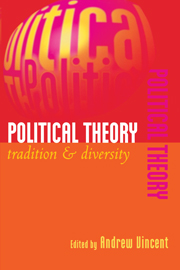Book contents
- Frontmatter
- Contents
- Preface
- List of Contributors
- Introduction
- 1 Political Theory and Conceptual Change
- 2 Political Theory and the Problem of Anachronism
- 3 Utilitarianism as a Public Philosophy
- 4 Rational Choice Political Theory
- 5 Republican Political Theory
- 6 Liberalism, Multiculturalism and Oppression
- 7 Postcolonialism and Political Theory
- 8 Legal Positivism and Political Power
- 9 Political Theory, International Theory, and the Political Theory of International Relations
- 10 Method Matters: Feminism, Interpretation and Politics
- 11 The Political Philosophy of Deleuze and Guattari
- 12 The Object of Political Theory
- Index
11 - The Political Philosophy of Deleuze and Guattari
Published online by Cambridge University Press: 29 March 2011
- Frontmatter
- Contents
- Preface
- List of Contributors
- Introduction
- 1 Political Theory and Conceptual Change
- 2 Political Theory and the Problem of Anachronism
- 3 Utilitarianism as a Public Philosophy
- 4 Rational Choice Political Theory
- 5 Republican Political Theory
- 6 Liberalism, Multiculturalism and Oppression
- 7 Postcolonialism and Political Theory
- 8 Legal Positivism and Political Power
- 9 Political Theory, International Theory, and the Political Theory of International Relations
- 10 Method Matters: Feminism, Interpretation and Politics
- 11 The Political Philosophy of Deleuze and Guattari
- 12 The Object of Political Theory
- Index
Summary
It is difficult to read poststructuralist philosophers as political theorists, since their work does not appear to engage with the problems and normative commitments of mainstream political theory. In the case of Deleuze and Guattari, this difficulty is compounded by their own highly idiosyncratic terminology: when they discuss politics, it is in terms of machinic assemblages, becomings, nomadism, forms of capture, processes of reterritorialization and deterritorialization, and the like. The concept of deterritorialization is particularly important and will be discussed further below. To illustrate its role in Deleuze and Guattari's political theory, and its relation to other concepts, consider the section of A Thousand Plateaus entitled ‘Micropolitics and Segmentarity’, in which they take up the concept of segmentation of social space as developed by anthropologists. They argue that the social fabric of modern capitalist society is segmented in a variety of ways, in its economic and political organization no less than in its language and its organization of desire. Different types of segmentation result in different kinds of line through social space: molar lines, which correspond to the forms of rigid segmentation found in bureaucratic and hierarchical institutions; molecular lines, which correspond to the fluid or overlapping forms of division characteristic of ‘primitive’ territoriality; and finally, lines of flight or deterritorialization, which are the paths along which things change or become transformed into something else.
- Type
- Chapter
- Information
- Political TheoryTradition and Diversity, pp. 237 - 253Publisher: Cambridge University PressPrint publication year: 1997



